2017 Year-in-Review by Gardner Dozois
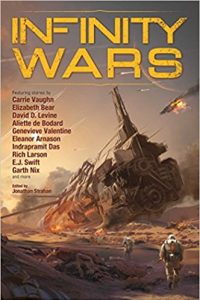 Last year I mentioned that most of the stories I was seeing were of short-story length, with few long novelettes or novellas. Although perhaps most of this year’s stories were still of short-story length, this year saw a dramatic resurgence of novellas. By one count, there were over 80 novellas published in the SF/fantasy/horror genres in 2017. Most of these were published as standalone chapbooks, and the ambitious new program from Tor.com Publishing can account for a lot of these. There were also many released by a wide array of small presses, as Kickstarter projects, and in electronic formats. Industry stalwarts such as Asimov’s, Analog, and F&SF continued to publish novellas as well, as they’ve always done, and even Clarkesworld, which had formerly had strict word-limits, seems to be loosening up and increasing the length of stories that they’re willing to accept.
Last year I mentioned that most of the stories I was seeing were of short-story length, with few long novelettes or novellas. Although perhaps most of this year’s stories were still of short-story length, this year saw a dramatic resurgence of novellas. By one count, there were over 80 novellas published in the SF/fantasy/horror genres in 2017. Most of these were published as standalone chapbooks, and the ambitious new program from Tor.com Publishing can account for a lot of these. There were also many released by a wide array of small presses, as Kickstarter projects, and in electronic formats. Industry stalwarts such as Asimov’s, Analog, and F&SF continued to publish novellas as well, as they’ve always done, and even Clarkesworld, which had formerly had strict word-limits, seems to be loosening up and increasing the length of stories that they’re willing to accept.
The odd result of this is that you have a lot of novellas on one end of the scale and a lot of short-stories on the opposite end, with fewer novelettes in between. Perhaps, like the mid-list in book publishing, novelettes are becoming marginalized.
There were a lot of original anthologies published in 2017. The SF anthologies divided up into two rough groups, the space opera/military SF anthologies (with the balance between the two forms varying from book to book), and the futurology anthologies, many of them with corporate or government sponsors, leading Jonathan Strahan to dub them “Think-Tank Fiction.” The strongest original SF anthology of the year was Strahan’s Infinity Wars, ostensibly a collection of military SF, although in some ways it’s actually a kind of stealth anti-war anthology, with character after character wrestling with doubts about the morality of the war and the orders they’ve been given. The best stories here are Indrapramit Das’s “The Moon Is Not a Battlefield” and Nancy Kress’s “Dear Sarah”, although there are also strong stories by Eleanor Arnason, Peter Watts, Rich Larson, Carrie Vaughn, An Owomoyola, Elizabeth Bear, David E. Levine, E.J. Swift, and others.
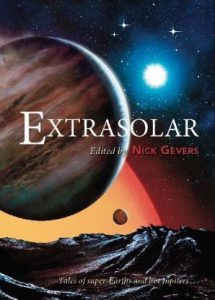 In this grouping, the next two strongest anthologies are probably Nick Gever’s Extrasolar and John Joseph Adam’s Cosmic Powers. Extrasolar‘s premise is that its writers are going to take us on a “tour of the stars in our galactic neighborhood,” drawing on the knowledge about exotic stars and extrasolar planets derived from more than 20 years of observation by the Kepler telescope and other space telescopes. It’s knowledge that paints a very different picture of what a solar system can be like and it has thrown new fuel on the fire of the debate about the Fermi Paradox. As such, it fits a bit uneasily into the space opera/military SF grouping, although stories here by Alastair Reynolds, Aliette de Bodard, and others could easily be considered Military SF. Best stories here, in addition to the Reynolds and de Bodard stories, are “Canoe” by Nancy Kress and “The Residue of Fire” by Robert Reed, although Extrasolar also featured strong work from Kathleen Ann Goonan, Jack McDevitt, Gregory Benford, Paul Di Filippo, Terry Dowling, Ian Watson, Lavie Tidhar, Ian R. MacLeod, and others. Cosmic Powers is much more a space opera anthology, unsurprising in an anthology where the editor asked for stories in the spirit of the Marvel movie Guardians of the Galaxy – and that’s pretty much exactly what he got. The best stories here are “Zen and the Art of Starship Maintenance” by Tobias S. Buckell, “The Dragon That Flew Out of the Sun” by Aliette de Bodard, “Golden Ring” by Karl Schroeder, “The Chameleon’s Gloves” by Yoon Ha Lee, and “Diamond and the World Breaker” by Linda Nagata. There’s also strong work here by Seanan McGuire, Charlie Jane Anders, and Kameron Hurley, as well as reprints by Vylar Kaftan, Caroline M. Yoachim, and others. Bryan Thomas Schmidt’s Infinite Stars is the anthology in this grouping most oriented toward military SF. A mixed original/reprint anthology, the best of the original stories here are Alastair Reynolds’s “Night Passage” and Linda Nagata’s “Region Five”, but there’s also good work here by Charles E. Gannon, David Weber, Jody Lynn Nye, David Drake, Jack Campbell, and Elizabeth Moon. Adding substantially to the value of Infinite Stars is a strong list of reprint stories by Poul Anderson, Cordwainer Smith, Leigh Brackett & Edmond Hamilton, Robert Silverberg, Lois McMaster Bujold, Larry Niven & Jerry Pournelle, Nnedi Okorafor, A.C. Crispin, and Anne McCaffery,
In this grouping, the next two strongest anthologies are probably Nick Gever’s Extrasolar and John Joseph Adam’s Cosmic Powers. Extrasolar‘s premise is that its writers are going to take us on a “tour of the stars in our galactic neighborhood,” drawing on the knowledge about exotic stars and extrasolar planets derived from more than 20 years of observation by the Kepler telescope and other space telescopes. It’s knowledge that paints a very different picture of what a solar system can be like and it has thrown new fuel on the fire of the debate about the Fermi Paradox. As such, it fits a bit uneasily into the space opera/military SF grouping, although stories here by Alastair Reynolds, Aliette de Bodard, and others could easily be considered Military SF. Best stories here, in addition to the Reynolds and de Bodard stories, are “Canoe” by Nancy Kress and “The Residue of Fire” by Robert Reed, although Extrasolar also featured strong work from Kathleen Ann Goonan, Jack McDevitt, Gregory Benford, Paul Di Filippo, Terry Dowling, Ian Watson, Lavie Tidhar, Ian R. MacLeod, and others. Cosmic Powers is much more a space opera anthology, unsurprising in an anthology where the editor asked for stories in the spirit of the Marvel movie Guardians of the Galaxy – and that’s pretty much exactly what he got. The best stories here are “Zen and the Art of Starship Maintenance” by Tobias S. Buckell, “The Dragon That Flew Out of the Sun” by Aliette de Bodard, “Golden Ring” by Karl Schroeder, “The Chameleon’s Gloves” by Yoon Ha Lee, and “Diamond and the World Breaker” by Linda Nagata. There’s also strong work here by Seanan McGuire, Charlie Jane Anders, and Kameron Hurley, as well as reprints by Vylar Kaftan, Caroline M. Yoachim, and others. Bryan Thomas Schmidt’s Infinite Stars is the anthology in this grouping most oriented toward military SF. A mixed original/reprint anthology, the best of the original stories here are Alastair Reynolds’s “Night Passage” and Linda Nagata’s “Region Five”, but there’s also good work here by Charles E. Gannon, David Weber, Jody Lynn Nye, David Drake, Jack Campbell, and Elizabeth Moon. Adding substantially to the value of Infinite Stars is a strong list of reprint stories by Poul Anderson, Cordwainer Smith, Leigh Brackett & Edmond Hamilton, Robert Silverberg, Lois McMaster Bujold, Larry Niven & Jerry Pournelle, Nnedi Okorafor, A.C. Crispin, and Anne McCaffery,
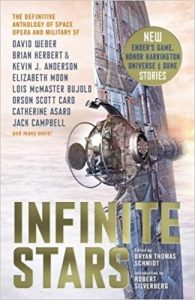 Of the near-future futurology/Think Tank anthologies, the strongest was Visions, Ventures, Escape Velocities, edited by Ed Finn & Joey Eschrich, a mixed fiction/non-fiction anthology about space futures from Arizona State University, sponsored by NASA, which featured strong stories by Carter Scholz, Madeline Ashby, Eileen Gunn, Vandana Singh, Ramez Naam, and Steven Barnes. Also strong is another mixed fiction/non-fiction anthology, Chasing Shadows: Visions of Our Coming Transparent World, edited by David Brin & Stephen W. Potts. Best of the original stories here are “Elephant on Table” by Bruce Sterling, “First Presentation” by Aliette de Bodard, and “Eminence” by Karl Schroeder, but the anthology also features good work by Nancy Fulda, Jack Skillingstead, Gregory Benford, Cat Rambo, and Brenda Cooper. Good reprints in Chasing Shadows include work by Damon Knight, Robert Silverberg, Kathleen Ann Goonan, Vernor Vinge, William Gibson, Neal Stephenson, Brin himself, and others. Another fairly strong futurology anthology is Sunvault: Stories of Solarpunk and Eco-Speculation, edited by Phoebe Wagner & Brontë Christopher Wieland. Sunvault features strong stories by Lavie Tidhar, A.C. Wise, Nisi Shawl, Jess Barber, and Tyler Young, as well as reprints by Daniel José Older and Nick Wood.
Of the near-future futurology/Think Tank anthologies, the strongest was Visions, Ventures, Escape Velocities, edited by Ed Finn & Joey Eschrich, a mixed fiction/non-fiction anthology about space futures from Arizona State University, sponsored by NASA, which featured strong stories by Carter Scholz, Madeline Ashby, Eileen Gunn, Vandana Singh, Ramez Naam, and Steven Barnes. Also strong is another mixed fiction/non-fiction anthology, Chasing Shadows: Visions of Our Coming Transparent World, edited by David Brin & Stephen W. Potts. Best of the original stories here are “Elephant on Table” by Bruce Sterling, “First Presentation” by Aliette de Bodard, and “Eminence” by Karl Schroeder, but the anthology also features good work by Nancy Fulda, Jack Skillingstead, Gregory Benford, Cat Rambo, and Brenda Cooper. Good reprints in Chasing Shadows include work by Damon Knight, Robert Silverberg, Kathleen Ann Goonan, Vernor Vinge, William Gibson, Neal Stephenson, Brin himself, and others. Another fairly strong futurology anthology is Sunvault: Stories of Solarpunk and Eco-Speculation, edited by Phoebe Wagner & Brontë Christopher Wieland. Sunvault features strong stories by Lavie Tidhar, A.C. Wise, Nisi Shawl, Jess Barber, and Tyler Young, as well as reprints by Daniel José Older and Nick Wood.
Many of the year’s other Think Tank anthologies don’t have physical copies available, but are available online, including A Flight to the Future, edited by Kathryn Cramer, sponsored by an X Prize and by the Japanese airline company Ana; Wired: The Fiction Issue: Tales from an Uncertain Future edited by Scott Dadich, Stories in the Stratosphere, from Arizona State University, edited by Michael G. Bennett, Joey Eschrich & Ed Finn, and Megatech, sponsored by The Economist magazine, edited by Daniel Franklin. A subset of futurology anthologies is dystopian anthologies, and there were two this year; Global Dystopias, a special section of the Boston Review, edited by Junot Díaz, featuring strong if rather grim and brutal work by Charlie Jane Anders, Tananerive Due, and Maureen F. McHugh, and Welcome to Dystopia, edited by Gordon Van Gelder, a very near future anthology (with some stories set next year and few more than ten years on, concentrating mostly on negative results of President Trump’s policies), featuring good work by Geoff Ryman, Janis Ian, Ruth Nestvold, Marguerite Reed, Elizabeth Bourne, Paul Witcover, and others.
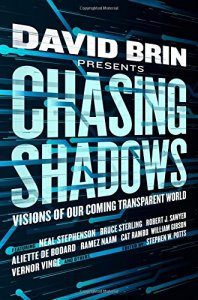 A bit harder to categorize: Children of a Different Sky, edited by Alma Alexander, is a mixed SF and fantasy anthology about refugees and immigrants, with part of the profits donated to various charitable institutions that help refugees; good work here by Aliette de Bodard, Jacey Bedford, Brenda Cooper, Seanan McGuire, and others. Where the Stars Rise: Asian Science Fiction and Fantasy, edited by Lucas K. Law & Derwin Mak, is a mixed SF/fantasy anthology featuring good stuff by S.B. Divya, Priya Sridhar, Tony Pi, Jeremy Szal, Amanda Sun, and others. Shadows & Reflections: Stories from the Worlds of Roger Zelazny, edited by Trent Zelazny & Warren Lapine, is a tribute anthology that offers other writers the chance to play with Zelazny’s worlds and characters; good stuff here by Steven Brust, Gerald Hansman, Lawrence Watt-Evans, Shariane Lewitt, and others.
A bit harder to categorize: Children of a Different Sky, edited by Alma Alexander, is a mixed SF and fantasy anthology about refugees and immigrants, with part of the profits donated to various charitable institutions that help refugees; good work here by Aliette de Bodard, Jacey Bedford, Brenda Cooper, Seanan McGuire, and others. Where the Stars Rise: Asian Science Fiction and Fantasy, edited by Lucas K. Law & Derwin Mak, is a mixed SF/fantasy anthology featuring good stuff by S.B. Divya, Priya Sridhar, Tony Pi, Jeremy Szal, Amanda Sun, and others. Shadows & Reflections: Stories from the Worlds of Roger Zelazny, edited by Trent Zelazny & Warren Lapine, is a tribute anthology that offers other writers the chance to play with Zelazny’s worlds and characters; good stuff here by Steven Brust, Gerald Hansman, Lawrence Watt-Evans, Shariane Lewitt, and others.
There were only a few original fantasy anthologies this year. One of the most acclaimed was The Djinn Falls in Love and Other Stories, edited by Mahvesh Murad & Jared Shurin, which featured strong work by Helene Wecker, K.J. Parker, E.J. Swift, Nnedi Okorafor, Catherine King, JY Yang, Maria Dahvana Headley, and others. Noted without comment is The Book of Swords, edited by Gardner Dozois. Although there are streaks of darkness in it, the subject matter of Mad Hatters and March Hares, edited by Ellen Datlow, tends to make the stories more whimsical than horrific, so I’m going to list it here in fantasy rather than horror; there are good stories here by Andy Duncan, Ysabeau S. Wilce, Richard Bowes, Seanan McGuire, Jane Yolen, Jeffrey Ford, Delia Sherman, and others.
I don’t pay close attention to the horror field, considering it out of my purview, but the original horror anthologies that got the most attention seemed to be Black Feathers and Haunted Nights, both edited by Ellen Datlow.
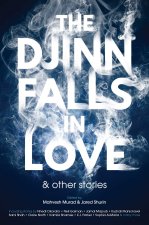 Turning to magazines, Clarkesworld had another strong year, publishing first-rate work by Kelly Robson, Naomi Kritzer, Rich Larson, Jack Skillingstead & Burt Coutier, Jessica Barber & Sara Saab, Vina Jie-Min Prasad, Finbar O’Reilly, and others. Asimov’s had another good year, publishing good work by Rich Larson, Ray Nayler, Harry Turtledove, Suzanne Palmer, Ian McHugh, Alex Jennings, R. Garcia y Robertson, Michael Swanwick, Kristine Kathryn Rusch, Carrie Vaughn, Tom Purdom, Damien Broderick, and others. Analog had an unusually strong year, publishing good stuff by Michael F. Flynn, Alec Nevala-Lee, Bill Johnson, Maggie Clark, Rich Larson, Joe Pitkin, James Van Pelt, and others. F&SF published good work by R.S. Benedict, Michael Swanwick, Samuel R. Delany, Matthew Hughes, Rachel Pollack, Kelly Jennings, Larry Niven, Robert Reed, Naomi Kritzer, and others. Lightspeed had a somewhat weak year, but published good work by Indrapramit Das, Mari Ness, Cadwell Turnbull, Pat Murphy, Susan Palwick, Lina Rather, Greg Kurzawa, and others. Interzone also had a weakish year, but there was good stuff by Sean McMullen, Malcolm Devlin, Erica L. Satifka, T.R. Napper, Laura Mauron, and others. As always, Tor.com published a mix of SF, fantasy, dark fantasy, soft horror, and more unclassifiable stuff this year, with good work by Greg Egan, Linda Nagata, Stephen Baxter, Allen M. Steele, Jo Walton, Julianna Baggott, Lavie Tidhar, Yoon Ha Lee, and others. Beneath Ceaseless Skies published good stuff by Richard Parks, Stephen Case, Carrie Vaughn, Sarah Saab, Tony Pi, M. Bennardo, Marissa Lingen, Rose Lemberg, Kameron Hurley, Jeremy Sim, and others. There wasn’t a lot of SF to be found in Strange Horizons this year, which seems to have swerved back to mostly slipstream, but they did publish interesting work by Ana Hurtado, Helena Bell, Iona Sharma, Su-Yee, and others. Newish magazine Uncanny had entertaining stories by Naomi Kritzer, Sarah Pinsker, Sam J. Miller & Lara Eleana Donnelly, Seanan McGuire, Vina Jie-Min Prasad, Sarah Monette, N.K. Jemisin, Fran Wilde, Tina Connolly, and others.
Turning to magazines, Clarkesworld had another strong year, publishing first-rate work by Kelly Robson, Naomi Kritzer, Rich Larson, Jack Skillingstead & Burt Coutier, Jessica Barber & Sara Saab, Vina Jie-Min Prasad, Finbar O’Reilly, and others. Asimov’s had another good year, publishing good work by Rich Larson, Ray Nayler, Harry Turtledove, Suzanne Palmer, Ian McHugh, Alex Jennings, R. Garcia y Robertson, Michael Swanwick, Kristine Kathryn Rusch, Carrie Vaughn, Tom Purdom, Damien Broderick, and others. Analog had an unusually strong year, publishing good stuff by Michael F. Flynn, Alec Nevala-Lee, Bill Johnson, Maggie Clark, Rich Larson, Joe Pitkin, James Van Pelt, and others. F&SF published good work by R.S. Benedict, Michael Swanwick, Samuel R. Delany, Matthew Hughes, Rachel Pollack, Kelly Jennings, Larry Niven, Robert Reed, Naomi Kritzer, and others. Lightspeed had a somewhat weak year, but published good work by Indrapramit Das, Mari Ness, Cadwell Turnbull, Pat Murphy, Susan Palwick, Lina Rather, Greg Kurzawa, and others. Interzone also had a weakish year, but there was good stuff by Sean McMullen, Malcolm Devlin, Erica L. Satifka, T.R. Napper, Laura Mauron, and others. As always, Tor.com published a mix of SF, fantasy, dark fantasy, soft horror, and more unclassifiable stuff this year, with good work by Greg Egan, Linda Nagata, Stephen Baxter, Allen M. Steele, Jo Walton, Julianna Baggott, Lavie Tidhar, Yoon Ha Lee, and others. Beneath Ceaseless Skies published good stuff by Richard Parks, Stephen Case, Carrie Vaughn, Sarah Saab, Tony Pi, M. Bennardo, Marissa Lingen, Rose Lemberg, Kameron Hurley, Jeremy Sim, and others. There wasn’t a lot of SF to be found in Strange Horizons this year, which seems to have swerved back to mostly slipstream, but they did publish interesting work by Ana Hurtado, Helena Bell, Iona Sharma, Su-Yee, and others. Newish magazine Uncanny had entertaining stories by Naomi Kritzer, Sarah Pinsker, Sam J. Miller & Lara Eleana Donnelly, Seanan McGuire, Vina Jie-Min Prasad, Sarah Monette, N.K. Jemisin, Fran Wilde, Tina Connolly, and others.
Gardner Dozois was the editor of Asimov’s Science Fiction magazine for almost twenty years, and also edits the annual anthology series The Year’s Best Science Fiction, which has won the Locus Award for Best Anthology more than any other anthology series in history, and which is now up to its Thirty-Fourth Annual Collection. He’s won the Hugo Award fifteen times as the year’s Best Editor, won the Locus Award thirty-one times, including an unprecedented sixteen times in a row as Best Editor, and has won the Nebula Award twice, as well as a Sidewise Award, for his own short fiction, which has been most recently collected in When the Great Days Come. He is the author or editor of more than a hundred books, including a novel written in collaboration with George R.R. Martin and Daniel Abraham, Hunter’s Run, and, in addition to many solo anthologies, the anthologies, Songs of the Dying Earth, Warriors, Dangerous Women, and Rogues, all co-edited with George R.R. Martin, the last two of which were New York Times bestsellers. Coming up is a major solo fantasy anthology, The Book of Swords. He has been inducted into the Science Fiction Hall of Fame, and won the Skylark Award for Lifetime Achievement in Science Fiction. Born in Salem, Massachusetts, he now lives in Philadelphia, Pennsylvania.
This article and more like it in the February 2018 issue of Locus.
 While you are here, please take a moment to support Locus with a one-time or recurring donation. We rely on reader donations to keep the magazine and site going, and would like to keep the site paywall free, but WE NEED YOUR FINANCIAL SUPPORT to continue quality coverage of the science fiction and fantasy field.
While you are here, please take a moment to support Locus with a one-time or recurring donation. We rely on reader donations to keep the magazine and site going, and would like to keep the site paywall free, but WE NEED YOUR FINANCIAL SUPPORT to continue quality coverage of the science fiction and fantasy field.






